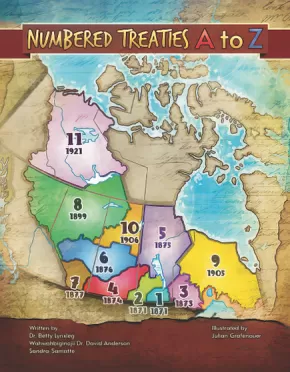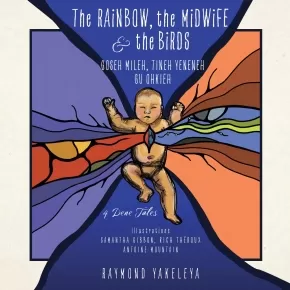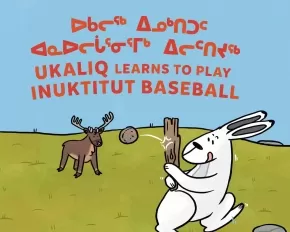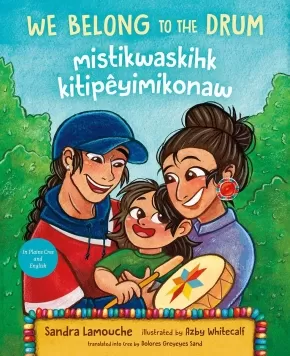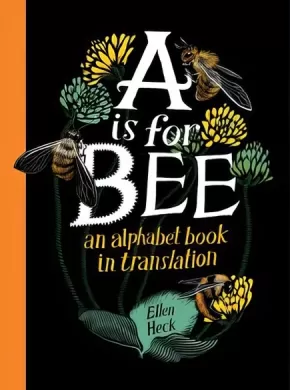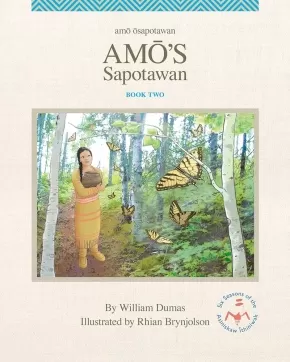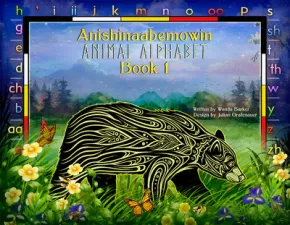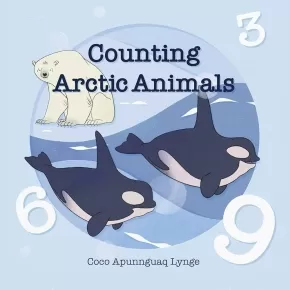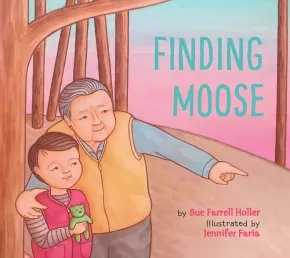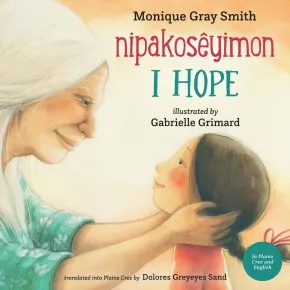
Language
166
-
180
of
418 Results;
Sort By
Go To
of 28
Suupi and the Sun Celebration
$14.95
Artists:
Format:
Paperback
Text Content Territories:
Indigenous Canadian; Inuit;
Grade Levels: Preschool; Kindergarten;
ISBN / Barcode: 9781774506943
Synopsis:
Synopsis:
Join in on the Sun Celebration in Grise Fiord, Nunavut, in this charming bilingual storybook!
Suupi lives in Grise Fiord, Nunavut. After three months of darkness in her community, the sun is finally about to return. Suupi and her friends can’t focus on their schoolwork. Today they will celebrate the return of the sun! There will be a sliding competition, a school performance, and a community feast. But Suupi is nervous about performing with her class in front of so many people. Will she find a way to overcome her fear?
Written by an author from Grise Fiord, a community in Nunavut where the sun doesn’t rise for nine months, Suupi and the Sun Celebration introduces readers to traditions within this Northern community that commemorate the return of the sun each year.
Educator & Series Information
Recommended for ages 3 to 5.
Bilingual Inuktitut and English Edition
Themes: Family, Community, Return of the Sun, Celebrations, Singing, Traditional Songs, Throat Singing, Sun Celebration
This book is part of the Community Connections series.
Additional Information
44 pages | 8.00" x 8.00". Paperback
The Great Giants of the Arctic
$22.95
Artists:
Format:
Hardcover
Text Content Territories:
Indigenous Canadian; Inuit;
ISBN / Barcode: 9781774506608
Synopsis:
Synopsis:
“Long ago, there lived great giants in the Arctic.”
But where did they go? Learn all about the famous giants of the North, including Inukpasuksuk, Nuvuja, and others. Why do winds from the south bring warm weather? What happens when the giant in the sky gets upset? The Great Giants of the Arctic answers these questions and more using simple language for young readers to enjoy.
This stunningly illustrated bilingual picture book serves as an early-level introduction to the rich, mysterious world of Inuit mythology. Adapted by author and linguist Jaypeetee Arnakak with the intention of teaching Inuktitut as as a second language, The Great Giants of the Arctic can be enjoyed by Inuktitut language learners and curious young readers alike.
Educator Information
Recommended for ages 3 to 6.
Bilingual: Inuktitut and English
Additional Information
36 pages | 8.50" x 8.50"| Hardcover
The Numbered Treaties A to Z
$24.95
Artists:
Format:
Paperback
Text Content Territories:
Indigenous Canadian;
ISBN / Barcode: 9781990297342
Synopsis:
Synopsis:
Let us walk together through the ABCs of the Numbered Treaties. We purposefully use the ABC, a constructed Language system from the English Language, to talk back to the Numbered Treaties, so named without reference to our Own Language system or the Land.
First Nations People entered into Treaties and Agreements prior to Confederation and negotiated the Numbered Treaties after the Confederation of Canada in 1867.
Educator Information
Recommended for grades 4 to 6.
Additional Information
Paperback
The Rainbow, the Midwife, and the Birds: 4 Dene Tales
$29.95
Artists:
Format:
Paperback
Text Content Territories:
Indigenous Canadian; First Nations; Dene;
ISBN / Barcode: 9781988824574
Synopsis:
Synopsis:
The book contains four Dene stories, as told by Raymond Yakeleya. "Flight Through the Rainbow" is about flying through a rainbow in a small plane and experiencing multi-sensations of colour. It also tells the legend of the spider and how its web catches raindrops that create the rainbow. "The Midwife and the Spirit of Life," dedicated to Raymond's Granny Harriet Gladue, is about the birth of babies and bringing their spirits into the world. "The Slingshot and the Songbird" is about a boy's sadness over killing a friendly songbird. "The Medicine Brothers and the Giant Birds" is a tale told to Raymond by his uncle George Blondin about the hazards of giant animals when the world was new.
The book also contains Dene language translation of terms from the book.
Educator & Series Information
This book is recommended for ages 8 to 12.
This book is part of the Indigenous Spirit of Nature series.
Additional Information
48 pages | 8.50" x 8.50" | Paperback
The Story of the Fox and the Wolf
$22.95
Artists:
Format:
Hardcover
Text Content Territories:
Indigenous Canadian; Inuit;
ISBN / Barcode: 9781774506813
Synopsis:
Synopsis:
Wolf wants to know how Fox catches so many fish. Fox thinks Wolf is trying to play a trick on him. Wolf claims he will catch many more fish than Fox ever could. Can Fox teach Wolf a lesson about being boastful and greedy?
Discover this engaging retelling of an Inuit traditional story, which has been simplified for young readers to enjoy.
Educator Information
Recommended for ages 5 to 7.
Bilingual: Inuktitut and English
F&P Level: L
Additional Information
32 pages | 8.50" x 8.50" | Hardcover
Ukaliq Learns to Play Inuktitut Baseball (English/Inuktitut)
$14.95
Artists:
Format:
Paperback
Text Content Territories:
Indigenous Canadian; Inuit;
Grade Levels: Preschool; Kindergarten;
ISBN / Barcode: 9781774506615
Synopsis:
Synopsis:
Team Tuktu and Friends is up to bat! Ukaliq is excited to spend the day with his friends, but he’s nervous about playing Inuktitut baseball. What if he isn’t any good at it? Tiri is fast, Nanuq is strong, and Tuktu has good aim. What if Ukaliq can’t even hit the ball? As the game ramps up and Ukaliq steps up to the plate, will he be able to discover his own unique baseball talent?
Educator & Series Information
Recommended for ages 3 - 5.
This is an Arvaaq Book. Books in this series are intended for infants and very young children and are designed to help children develop physical, social, emotional, cognitive, and language skills.
Ukaliq Learns to Play Inuktitut Baseball shows children that everyone has their own unique skills.
F&P Level: L
Bilingual: English and Inuktitut
Additional Information
32 pages | 8.00" x 10.00" | Paperback
We Belong to the Drum / mistikwaskihk kitipeyimikonaw
$21.95
Artists:
Format:
Hardcover
Text Content Territories:
Indigenous Canadian; First Nations; Cree (Nehiyawak); Woodland Cree; Woods Cree; Bigstone Cree Nation;
Grade Levels: Preschool; Kindergarten;
ISBN / Barcode: 9781459834385
Synopsis:
Synopsis:
The drum represents the heartbeat of Mother Earth. We all belong to the earth and we all belong to the drum.
Nikosis grew up going to powwows with his family, happily immersed in music, dance and the sounds of the drum. But when he starts going to daycare, he doesn’t feel like he belongs. Nikosis cries every time his mother leaves him in the unfamiliar environment until, one day, she and the teachers use drums to help Nikosis find connection and comfort.
Inspired by her son’s experience—and her family's love of powwow music and dance—Indigenous educator and champion hoop dancer Sandra Lamouche shares this uplifting true story of the transformative effects of culturally safe and inclusive early childhood education.
Educator Information
Recommended for ages 3 to 5.
This is the dual-language version, in English and Plains Cree.
A free, downloadable poster for this book is available: Poster - We Belong to the Drum
About the Translator
As a first-language speaker of Plains Cree (nêhiyawêwin), translator Dolores Greyeyes Sand has devoted her career to teaching and promoting Cree language and cultural literacy at every opportunity, proudly following the path laid by her late mother, Dr. Freda Ahenakew, CM, SOM.
Find the English version here: We Belong to the Drum
Additional Information
32 pages | 8.75" x 10.75" | Hardcover
A Is for Bee: An Alphabet Book in Translation
$26.99
Artists:
Format:
Hardcover
ISBN / Barcode: 9781646141272
Synopsis:
Synopsis:
What letter does the word bee start with?
If you said "B" you're right – in English!
But in many, many languages, it actually starts with A.
Bee is Anū in Igbo,
Aamoo in Ojibwe,
Abelha in Portugese.
And Ari in Turkish.
Come and explore the gorgeous variations in the ways we talk about familiar things, unified and illuminated through Ellen Heck's eye-catching, graphic scratchboard details and hidden letterforms.
Educator Information
Recommended for ages 3 to 9.
Includes some Indigenous words.
Additional Information
40 pages | 7.75 x 10.5 | Hardcover
A Little Plains Cree Book for Children: A Reference for Teaching the Plains Cree Language
$74.95
Format:
Paperback
Text Content Territories:
Indigenous Canadian; First Nations; Cree (Nehiyawak); Plains Cree;
ISBN / Barcode: 9781778690044
Synopsis:
Synopsis:
A Little Plains Cree Book for Children contains useful noun categories, phrases, and some basic rules for the Plains Cree language. Following the themes of the Saskatchewan Curriculum Guide for Kindergarten to Grade 12 on Aboriginal Languages, the content focuses on terms familiar to the First Nations Cree people of Saskatchewan. This book should also be supplemented by total physical response (TPR) methods, in addition to teaching materials such as songs, games, and flash cards. Our hope is to encourage a basic understanding of the language so that learners are able to converse with Plains Cree speakers. The best path to fluency in the Plains Cree language is immersion, but learning one word at a time is a good place to start!
Educator Information
Recommended for ages 5+
A teaching guide can be found here: nēhiyawēwin awāsi-masinahikanis: A Little Plains Cree Book for Children—Teaching Guide
Find a colouring book here: A Little Plains Cree Colouring Book: Plains Cree People
Additional Information
96 pages | 8.50" x 11.00" | Paperback
Amo's Sapotawan
$33.00
Artists:
Format:
Hardcover
Text Content Territories:
Indigenous Canadian; First Nations; Cree (Nehiyawak); Woodland Cree; Rocky Cree;
ISBN / Barcode: 9781553799290
Synopsis:
Synopsis:
A Rocky Cree girl must choose the skill that will define her miskanaw, the path of her life, in the second book of The Six Seasons of the Asiniskaw Īthiniwak series.
Rocky Cree people understand that all children are born with four gifts or talents. When a child is old enough, they decide which gift, or mīthikowisiwin, they will seek to master. With her sapotawan ceremony fast approaching, Amō must choose her mīthikowisiwin. Her sister, Pīsim, became a midwife; others gather medicines or harvest fish. But none of those feel quite right.
Amō has always loved making things. Her uncle can show her how to make nipisiwata, willow baskets. Her grandmother can teach her how to make kwakwāywata, birchbark containers and plates. Her auntie has offered to begin Amō’s apprenticeship in making askihkwak, pottery.
What will Amō’s mīthikowisiwin be? Which skill should she choose? And how will she know what is right for her?
Educator & Series Information
Recommended for ages 9 to 11.
This is the second book in The Six Seasons of the Asiniskaw Īthiniwak series.
Reading Level: Fountas & Pinnell X
Includes some Cree language.
Additional Information
60 pages | 10.00" x 12.00" | Hardcover
Anishinaabemowin Animal Alphabet Book 1
$19.99
Artists:
Format:
Paperback
Text Content Territories:
Indigenous Canadian; First Nations; Anishinaabeg; Ojibway;
ISBN / Barcode: 9781990297526
Synopsis:
Synopsis:
Anishinaabe educator and author Wanda Barker, Bear Clan from Hollow Water First Nation brings her knowledge and fluency in Anishinaabemowin to language learners in her book Anishinaabemowin Animal Alphabet Book 1. This alphabet book focuses on the letters used in the double vowel writing system. The book focuses on learning the names of animals, information on the animals and their actions. A double vowel chart to learn the sounds and pronunciation is included.
Educator Information
Recommended for grades 1 to 3.
Additional Information
36 Pages
Counting Arctic Animals (BB)
$14.95
Artists:
Text Content Territories:
Indigenous Canadian; Inuit; Indigenous European; Greenlandic Inuit;
Grade Levels: Preschool;
ISBN / Barcode: 9781772274479
Synopsis:
Synopsis:
One bowhead whale! Two polar bears! Three orcas! Join Kuluk and Asa as they count all the animals they see! This introduction to counting and to Arctic animals helps young children develop their counting skills through short rhymes. It also introduces interesting collective nouns, like a blessing of narwhals and a bob of seals.
Reviews
"As a 1-10 counting book, Counting Arctic Animals works extremely well. While Apunnguaq Lynge’s superb illustrations are full of movement and action, she has not forgotten that each animal that is to be counted must be clearly differentiated. Highly Recommended"—CM: Canadian Review of Materials
Educator Information
Recommended for ages 2 and under.
Additional Information
24 pages | 8.00" x 8.00" | Board book
Feelings with Tuktu and Friends (English/Inuktitut) (BB) (1 in stock, in Reprint)
$16.95
Artists:
Format:
Board Book
Text Content Territories:
Indigenous Canadian; Inuit;
Grade Levels: Preschool;
ISBN / Barcode: 9781774505663
Synopsis:
Synopsis:
Tuktu and his friends are exploring their feelings!
In this interactive book, children follow along as the animal characters experience different emotions, such as sad, happy, scared, and excited. As they go through the book, children are encouraged to talk about the feelings and practise making faces that express them.
Educator & Series Information
Recommended for ages 3 and under.
This book helps young children identify and express their emotions.
This is an Arvaaq Book. Books in this series are intended for infants and very young children and are designed to help children develop physical, social, emotional, cognitive, and language skills.
Bilingual: English and Inuktitut
Additional Information
20 pages | 10.00" x 8.00" | Board Book
Finding Moose
$21.95
Artists:
Format:
Hardcover
Text Content Territories:
Indigenous Canadian; First Nations; Anishinaabeg; Ojibway;
ISBN / Barcode: 9781772782448
Synopsis:
Synopsis:
The creators of Raven, Rabbit, Deer are back with another thoughtful tale of a young boy and his grandfather taking a walk through the woods and all the creatures and plants they encounter.
Walking as “quiet as mice and rabbits and deer” they come upon fresh moose droppings and set out to find the moose itself. They discover the branches where the moose ate breakfast, greet a chipmunk and goose, and inspect rosehips and pussy willows, but the moose is nowhere to be found. Finally, after accepting that they will have to try again next time, the boy and his grandfather head home… only to be met with a big surprise.
In Finding Moose, Governor General’s Award-nominated author Sue Farrell Holler gives us a glimpse into the wondrous world of nature through the eyes of a curious child. Grandpa quietly encourages this curiosity while offering answers and further lessons where he can. Illustrator Jennifer Faria draws us in with gentle paintings that make us want to reach out and touch the scenery.
Reviews
“For a lovely early spring walk, learning about nature and being introduced to words in Ojibwemowin, join an Anishinaabe grandfather with his grandson to see how forest life reveals itself and search for an elusive mooz.”—CanLit for LittleCanadians
“Children will enjoy this simple story that introduces them to some of their forest neighbours whose names are in both English and Ojibwemowin. Highly recommended.”— Simcoe.com
“[T]his joyful book reinforces the need to listen, see, and be present in the woods so that the wonders of nature can unfold. The power of loving inter-generational relationships rests at the core of this simple story… The end result is a touching story that addresses important lessons at a time when environmental change is such a pressing concern.”—Children’s Literature
Educator Information
Recommended for ages 3 to 6.
Additional Information
32 pages | 9.00" x 8.00" | Hardcover
I Hope / nipakoseyimon
$21.95
Artists:
Format:
Hardcover
Text Content Territories:
Indigenous Canadian; First Nations; Cree (Nehiyawak); Plains Cree;
Grade Levels: Preschool; Kindergarten;
ISBN / Barcode: 9781459833258
Synopsis:
Synopsis:
Poignant words from award-winning Indigenous author Monique Gray Smith about all the hopes adults have for the young people in their lives.
The hopes we have for the children in our lives are endless. We want our young people to thrive and experience all that life has to offer, but we also feel protective of them. Using simple but powerful statements, Monique Gray Smith delivers a touching message about loving, nurturing and wishing the best for our children. Paired with Gabrielle Grimard's warm and enchanting illustrations, the message in I Hope will resonate with all parents, grandparents and caregivers.
Reviews
“Comforting, encouraging sentiments that adult readers and their little ones will appreciate.” — Kirkus Reviews
“Grimard’s artwork along with Gray Smith’s messages of hope create a synergy and context…Together they successfully teach intangible moments.” — CM: Canadian Review of Materials
"I Hope is a story about adults' hopes for the children in their lives. It speaks to the “hope” of the next generation thriving and experiencing all that life has to offer, even when there is a hesitation to be protective of them. The story focuses on loving, nurturing, and wishing the best for the children in our lives." - The Dalai Lama Center
Educator Information
Recommended for ages 3 to 5.
Dual-language format: English and Plains Cree.
This book is available in English only: I Hope
This book is available in French: J'espère
Cree translation by Dolores Greyeyes Sand.
Additional Information
32 pages | 9.00" x 9.00" | Hardcover
Sort By
Go To
of 28





